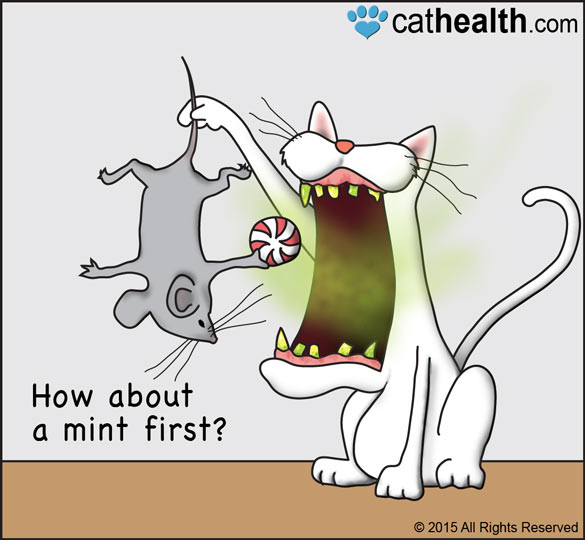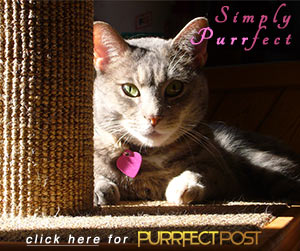Halitosis: Bad Breath in Cats

Halitosis (bad breath) in cats is a condition that can get your attention quickly when you're snuggling with your feline fur-baby. It's important to know what can cause bad breath so you'll know what to do if your cat's mouth odor suddenly has you wanting to push him away instead of return his friendly head bump.
What Causes Bad Breath in Cats?
Cats can normally have slightly fishy breath that smells like cat food, but it's usually not strong or offensive. Foul-smelling breath or a sudden increase in the breath's odor can be an early sign of a problem. Below are some of the conditions that can cause halitosis in cats.
-
Dental disease: This is one of the most common causes of halitosis in cats. Saliva and bacteria combine to form plaque on the teeth. If the plaque isn't removed, it mineralizes, becoming tartar. Plaque and tartar can lead to periodontal disease, or inflammation of the tooth-supporting structures, and gingivitis, or gum inflammation. Along with bad breath, in some cases of dental disease you might notice that your cat is reluctant to chew and is unwilling to have his mouth touched or manipulated.
It's important to ask your veterinarian about a routine preventative dental health program that includes tooth-brushing (with special pet toothpaste, not human toothpaste because it contains strong flavorings and potentially toxic ingredients), dental treats, and possibly a dental diet to get those teeth sparkling clean and freshen that breath. You can learn more about how to institute a home dental care plan in this article: "Home Dental Care for Cats." Your cat may also need a professional dental cleaning.
Untreated dental disease can lead to other medical issues, including oral pain, difficulty chewing food, abscesses of the teeth and salivary glands, tooth loss, and infection of other organs or systems in the body, including the heart and kidneys.
- Diet: Smelly diets, such as fish- or liver-based foods, treats, or supplements may contribute to bad breath in cats.
-
Foreign body in the mouth: Cat oral foreign bodies can include strings, rubber bands, bones, and other small objects. If these are not removed quickly, they can contribute to bad breath. If you see a foreign object in your cat's mouth, don't try to remove it yourself. You may cause more damage if it is attached in the gastrointestinal tract somewhere. Call your veterinarian or an emergency veterinary clinic immediately. You can learn more about why string objects are dangerous for cats in this article: "The Dangers of Strings, Ribbons, and Yarn for Cats."
Foreign bodies can also be swallowed and lead to dangerous obstructions in the esophagus, stomach, or intestines.
-
Excessive salivation: Also called hyper-salivation or ptyalism, excessive salivation usually occurs secondary to dental, neurologic, or metabolic disease and can result in significant halitosis.
Dried and matted fur can collect around the mouth after excessive drooling, which can contribute to a foul smell. Lip fold pyodermas (infections around the lips) can form and contribute to the halitosis. This is common in cats with certain types of allergies.
- Neurological disease: A cat's cranial nerves control the movements of his mouth and tongue. Any cranial nerve problem can affect the ability to open and close the mouth and control the tongue, resulting in hyper-salivation (see above) and halitosis. In addition, food and debris may collect in the mouth since the cat can't properly swallow or remove the excess food, contributing to some potent and terrible breath.
- Gingivitis, stomatitis, and other inflammatory oral disease: Cats are exquisitely susceptible to inflammation and inflammatory diseases of the oral cavity. Gingivitis is gum inflammation and stomatitis is inflammation of the mucous linings of the mouth tissues, throat, and even underlying bone. Gingivitis and stomatitis in cats are most commonly caused by bacteria, viruses, immune processes, or allergies. All of these conditions can lead to increased mouth odor.
-
Abscesses, tumors, or ulcers: Abscesses of the tooth roots, mouth structures, nasal cavity, or areas behind the eyes can cause bad breath in cats, as can tumors in the same locations. Ulcers secondary to trauma, infection, tumors, allergies, or metabolic diseases can also cause foul breath.
- Conformational abnormalities: Tooth misalignment, cleft palate, or an oronasal fistula (a hole between the oral and nasal cavity) can all cause halitosis in cats.
- Metabolic diseases: Diseases of the kidneys and liver can cause halitosis in cats because of the build-up of toxins in the blood as those organs become unable to properly remove them. Uncontrolled diabetes can also cause halitosis. Diseases of the stomach and intestines can cause bad breath in cats, as well, due to inflammation and bacterial overgrowth.
These are some of the conditions that can cause halitosis, or bad breath, in cats.It is very important to see your veterinarian to identify the cause of any bad breath you notice in your cat and facilitate treatment. Many of these conditions can be quite serious, and early diagnosis and treatment may be able to slow down or reverse both the halitosis and its underlying cause.
You May Also Like These Articles:
Giving Your Cat Clean and Fresh Water
Wet Food Vs. Dry Food For Cats
Why Does My Cat's Rear End Smell Bad?
Pet Insurance: Peace of Mind for Your Cat's Health
Notice: Ask-a-Vet is an affiliated service for those who wish to speak with a veterinary professional about their pet's specific condition. Initially, a bot will ask questions to determine the general nature of your concern. Then, you will be transferred to a human. There is a charge for the service if you choose to connect to a veterinarian. Ask-a-Vet is not manned by the staff or owners of CatHealth.com, and the advice given should not delay or replace a visit to your veterinarian.





